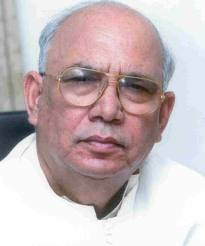
RAJESH SINGH
Now that the central government has rejected Mr H R Bhardwaj’s recommendation to impose President’s Rule in Karnataka, the Governor must vacate the Raj Bhavan. He is unwanted, distrusted and discredited in the state. He said recently that he was a guest of Karnataka and thus deserved respect going by the Indian tradition that holds a guest as god. True, but when that god turns demon it is time to exorcise it. While rejecting Mr Bhardwaj’s suggestion, the government issued an ‘advisory’ to the BJP government in the state on the points raised by the Governor. This is a fig leaf that he can use to cover his political modesty, but it may not serve the purpose. He has been too widely exposed.
Mr Bhardwaj’s political misadventure may yet fetch him some reward. After all, no one seriously believes he created all the turbulence without an assured lifeline from influential people in the Congress party and the UPA government. He is no ordinary Governor. He was until very recently a key member of the Cabinet, and is considered close to 10, Janpath. So, the central snub notwithstanding, he has his admirers who will work to resurrect him if and when he leaves the state. Reports have it that he may even return to the Union Council of Ministers. If that happens, Karnataka’s gain can be the UPA government’s loss, because Mr Bhardwaj’s tenure as Union Law Minister was less than distinguishing.
There are only two ways he can shift out: either voluntarily or being recalled by the central government. The government has already ruled out his recall, because that would have been too much of an ignominy for a loyalist. Besides, the move would have been interpreted as the central government’s complete capitulation to the BJP. Mr Bhardwaj can quit gracefully – or as gracefully as he can after fruitlessly messing up the state’s politics – and leave it to posterity to be kinder to him. Of course, he can also hang on and continue to denigrate the Raj Bhavan till his admirers find him a suitable job.
The fact is, Mr Bhardwaj is the wrong person to be a Governor. He is a politician at heart and loves the skullduggery and intrigue associated with politics. He effectively converted the Raj Bhavan into a den of political subversion. Given his track record he is rather good at the game, if one excludes the Karnataka fiasco. He might just have succeeded here too if things had gone as planned by him and a few others who collaborated with him in the ‘oust Yeddyurappa’ campaign. To be fair to Mr Bhardwaj he failed not for want of trying but because certain events shot off in a new direction that he neither had plotted nor anticipated. For instance, he had not imagined that the 16 legislators with whom he had been so indulgent when they raised a banner of revolt against the Chief Minister, Mr B S Yeddyurappa, would conduct a U-turn just when the time came to deliver the Chief Minister the knockout punch. After their disqualification was set aside by the Supreme Court, these legislators had the opportunity to avenge the humiliation by voting against Mr Yeddyurappa in a trial of strength. But in a remarkable turn of events that took even the seasoned Governor by surprise, the MLAs threw their lot behind the very man they had gone to elaborate extents to dislodge.
Understandably, after – from his point of view disturbing – recent events, the Governor had neither the enthusiasm nor the appetite to ask the Chief Minister for a trust vote. He had loved the mechanism in the past, compelling Mr Yeddyurappa to demonstrate a majority in the Assembly on two quick days late last year. But then he had used those tumultuous occasions to argue that the Chief Minister had survived in a dubious fashion, after the Speaker had disallowed the rebel Legislators to vote and disqualified them thereafter. There was no such happy point to be made this time around, because the Chief Minister would have won with a more emphatic margin after winning over the rebels. So the Governor meekly admitted that a vote of confidence was unnecessary since Mr Yeddyurappa enjoyed a “huge majority”. For good measure, he added that the Chief Minister was his ‘good friend”.
It is not clear when this friendship developed or whether Mr Yeddyurappa reciprocates the sentiment. But since we do know that Mr Bhardwaj stands by his friends – recollect how he has backed all the way the rebels and the Karnataka leaders of the JD (S) and the Congress in their bid to displace the Chief Minister – we eagerly await his rendition of Yeh dosti hum nahin todenge. For now Mr Yeddyurappa is unwilling to add voice to what should be a duet. Perhaps it only a coincidence that the Governor should have developed such warm feelings for the Chief Minister after being mauled by legal experts and various political parties for recommending the dismissal of an elected government that enjoys the majority support in the House, and subsequent to getting gentle hints that the Centre was unwilling to accept his report.
The gush of warmth did not dry out with the unilateral announcement of friendship. The Governor applauded Mr Yeddyurappa for working ’18 to 20 hours a day”, for Karnataka’s welfare. Good Lord, if that is true Mr Bhardwaj has been pushing for the dismissal of a Chief Minister who has been toiling hard for the state’s development, not to mention the fact that he commands a huge majority in the Assembly. It is a defining contradiction, but then the Governor has been less than coherent ever since the Centre dumped his report and the Chief Minister won over the rebels.